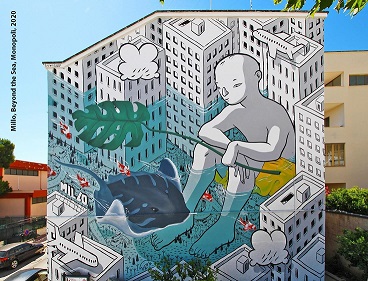Irony, Names and Linguistic Resistance: NoViolet Bulawayo’s We Need New Names as a World-Making Narrative
DOI:
https://doi.org/10.54103/2035-7680/18689Parole chiave:
African literature; NoViolet Bulawayo; migration; world-making narrativeAbstract
Contemporary works of African literature often engage in the depiction of a geographical and cultural dislocation inscribed in today’s pattern of global migration. NoViolet Bulawayo’s We Need New Names (2013) fits within this framework as a female coming-of-age novel that follows the story of Darling, from the character’s childhood in post-2000 Zimbabwe to the alienating experience of life as a migrant in the United States of America. The peculiarity of the novel lays in Bulawayo’s linguistic choices, in particular the use of irony and the practice of (re)naming, which come to represent the feelings of un-belonging and political disillusionment that define the characters’ geo-cultural displacement. Using the normative theory of literature (Cheah 2016) as a theoretical framework, this paper further analyses the use of such literary devices as tools through which the narrative opens up to alternative worlds of representation. In this sense, this paper argues that Bulawayo’s We Need New Names can be considered as a world-making narrative of cultural and linguistic resistance against the disruption of Zimbabwe’s socio-political situation.
Downloads
Riferimenti bibliografici
Achebe, Chinua. Things Fall Apart. Penguin Books Limited, 2013.
Baya, Raisedon, and Christopher Mlalazi. The Crocodile of Zambezi, 2008.
Bulawayo, NoViolet. We Need New Names. Vintage, 2013.
---. “Hitting Budapest.” Boston Review, 2010. https://bostonreview.net/bulawayo-hitting-budapest/. Accessed 23 Sep. 2021.
Brouillette, Sarah. “On the African Literary Hustle.” Blind Field Journal, 2017. https://blindfieldjournal.com/2017/08/14/on-the-african-literary-hustle/. Accessed 23 Sep. 2021.
Burns, Lorna. Postcolonialism After World Literature: Relation, Equality, Dissent. Bloomsbury Academy, 2019.
Cheah, Pheng. What Is a World? On Postcolonial Literature as World Literature. Duke UP, 2016.
D’haen, Theo, et al., editors. World Literature: A Reader. Routledge, 2012.
Ede, Amatoritsero. “Narrative Moment and Self-Anthropologizing Discourse.” Research in African Literatures, vol. 46, no. 3, 2015, pp. 112-129.
Fetterolf, Elizabeth. “Lost in Transnation: Reconciling Geographical, Linguistic and Cultural Distance in NoViolet Bulawayo’s ‘We Need New Names’.“ Senior Capstone Projects. 659, 2017.
Frassinelli, Pier Paolo. “Living in Translation: Borders, Language and Community in NoViolet Bulawayo’s We Need New Names.” Journal of Postcolonial Writing, vol. 51, no. 6, 2015, pp. 711-722.
Habila, Helon. “We Need New Names by NoViolet Bulawayo—Review.” The Guardian, 2013. https://www.theguardian.com/books/2013/jun/20/need-new-names-bulawayo-review/. Accessed 23 Sep. 2021.
Heidegger, Martin. Being and Time. New York UP, 1996.
Helgesson, Stefan, et al. Handbook of Anglophone World Literatures. De Gruyter, 2020.
Hove, Chenjerai. Bones. Baobab Books, 1988.
Marechera, Dambudzo. The House of Hunger. Pearson Education Limited, 2013.
Moji, Polo Belina. “New Names, Translation Subjectivities: (Dis)location and (Re)naming in NoViolet Bulawayo’s ‘We Need New Names’.” Journal of African Cultural Studies, vol. 27, no. 2, 2015, pp. 181-190.
Ncube, Gibson. “Mapping the Poetics of Names in the Novels of John Eppel, Petina Gappah and NoViolet Bulawayo.” The Postcolonial Condition of Names and Naming Practices in Southern Africa, edited by Oliver Nyambi et al., Cambridge Scholar Publishing, 2016, pp. 217-236.
Onyeoziri, Gloria Nne. Shaken Wisdom: Irony and Meaning in Postcolonial African Fiction. Virginia UP, 2011.
Peschel, Sabine. “Zimbabwean Author NoViolet Bulawayo: ‘I Like to Write from the Bone’.” Deutsche Welle, 2015. https://www.dw.com/en/zimbabwean-author-noviolet-bulawayo-i-like-to-write-from-the-bone/a-18572543/. Accessed 23 Sep. 2021.
Pfalzgraf, Magdalena. Mobility in Contemporary Zimbabwean Literature in English: Crossing Borders, Transcending Boundaries. Routledge, 2021.
Prendergast, Christopher, editor. Debating World Literature. Verso, 2004.
Slaughter, Barbara. “Zimbabwe: Mugabe’s Operation Murambatsvina.” World Socialist Website: International Committee of the Fourth National (ICFI), 2005. https://www.wsws.org/en/articles/2005/07/zimb-j16.html. Accessed 17 Nov. 2021.
Wainaina, Binyavanga. “How to Write About Africa.” Granta 92: The View from Africa, 2005. https://granta.com/how-to-write-about-africa/. Accessed 23 Sep. 2021.
Zvobgo, Chengetai J. M. A History of Zimbabwe, 1890-2000 and Postscript, Zimbabwe, 2001-2008. Cambridge Scholar Publishing, 2009.
Dowloads
Pubblicato
Come citare
Fascicolo
Sezione
Licenza

Questo articolo è soggetto a licenza Creative Commons Attribution-NonCommercial-NoDerivatives 3.0 International License.




